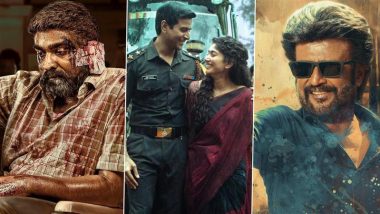Maamannan Movie Review: After the explosive Karnan, Mari Selvaraj returns with another potentially powerful drama, Maamannan, which is already in the news for its lead actor Udhayanidhi Stalin's supposedly last acting role (for the time being) and Vadivelu's serious turn as the titular character. Caste politics once again plays a dominant role in Maamannan, as with the director's previous films Karnan and the hard-hitting Pariyerum Perumal. While the performances of some of the cast members are excellent and the film boasts of certain powerful moments, Maamannan, however, could not sustain the momentum to be as memorable as the filmmaker's previous efforts. Maamannan Review: Dhanush Praises Udhayanidhi Stalin, Vadivelu, Fahadh Faasil, Keerthy Suresh’s Performances in Mari Selvaraj’s Political Thriller.
Maamannan (Vadivelu) is an MLA from the oppressed caste who is loved by his followers and is also respected in his party. However, the scars of oppression have not left his mind, as shown by his unquestionable reverence towards his leader (Azhigiyaperumal) and later to his son, the malevolent Rathnavelu (Fahadh Faasil). On the other hand, Maamannan shares a prickly relationship with his own son Athiveeran (Udhayanidhi Stalin).
While there is a sense of respect between the two, Athiveeran is not on speaking terms with his father for a deeply disturbing caste-related incident that happened in his childhood. However, a clash with Rathnavelu forces the father and son to join forces and they decide that it is time to revolt against the oppression of the arrogant abuser of his caste privilege.
Watch the Trailer of Maamannan:
Mari Selvaraj is a filmmaker known for serving up some powerful metaphors in his films with some stinging social commentary. The opening sequence itself is a proof of this, when Rathnavelu brutally beats to death one of his dogs (just check if John Wick is loading his guns anywhere) for daring to disobey him. This scene is intercut with Athiveeran motivating a boy from the oppressed caste to fight back in a contest against an upper-caste opponent without fear. The ring is set, the opponents are established, and I was eagerly waiting for the fight to start.
The fight does take some time to arrive, as Selvaraj takes his time to explore more of Mamannaan and Athiveeran's reticent relationship, and the vileness of Rathnavelu, who thankfully, does not come across as a cardboard caricature of cruelty. There are some strong visuals and the director continues to have animals as metaphors, with dogs and pigs used here, but there are also occasions where the director lingers a bit too much on a sequence to extract maximum emotion, but loses some impact in the process.
One such sequence is in the flashback scene involving the killing of three lower-caste kids by stone-pelting for bathing in the village pool. It is a very disturbing scene and could have been even more impactful if the director didn't indulge in too many slow-motion shots. Still, the first half is plentiful engaging, and even the love track between Athiveeran and Leela has its moments. The conflicts are also established well, and it leads to what is the film's best sequence.
The pre-interval sequence when Athiveeran instigates his father to break an age-old tradition and thereby creating a lifelong enemy in Rathnavelu is Selvaraj at his most effective. A powerful scene, it sets up for a bigger clash between the protagonists' craving for social justice and a villain who is left licking his wounded pride.
If in Karnan, the conflict evolved in the form of a violent confrontation, then in Maamannan, the conflict enters into a political milieu. However, the storytelling takes more of a backseat as the director gets rather invested in addressing the political incorrectness, and then takes a very predictable and rather lacklustre route. Another underwhelming factor is the treatment of Maamannan as a character. He is still at the forefront of things, and Vadivelu delivers a fantastic performance in the role as a man who finally recognises the need to sit on the same level as his oppressors. However, the character development is compromised in favor of the son's heroics, and he remains more of a supporting character in these portions. The screenplay also takes a very long-winded approach towards reaching a conclusion, and one particular fight sequence feels added just so that the hero could flex his muscles.
I also need to talk about an aspect that I found confusing when it comes to Selvaraj's political stance, in how he uses Lal's political leader character. Whether it is the makeup or the posturing, it is clear that this character is inspired by a very popular real-life politician in India. At first, I thought this was the director's way of taking a dig at this politician, however, as the plot progresses, this character is shown as someone who stands up for and supports social justice. Considering that the real-life inspiration is accused of being an antithesis to this, I wonder what is with this portrayal.
As for the performances, I have already written how Vadivelu is incredible as the title character, even if I wish the character had a stronger development. As for Udhayanidhi Stalin, I found the actor-politician to be quite okay as the hot-headed rebel. He is decent in certain scenes, but is pretty average in portions where emotional intensity is asked to be delivered. Keerthy Suresh does well with her limited screen time, and her tomboyish attitude makes this role stand out, but at times, she is ignored in the clash of the men. Keerthy Suresh In Striped Black Pantsuit For Maamannan Promotions Has To Be the Gold Standard of Fashion.
Fahadh Faasil is appropriately terrifying in what is his most negative character of his career. The actor does a splendid job of depicting the brutality and the vanity of his privilege-obsessed anarchist. AR Rahman's score does its job at amplifying certain scenes, but otherwise is not exactly his best. Theni Eswar's cinematography is excellent, but the idea to switch to black-and-white frames during flashback scenes loses its sheen after a point.
Final Thoughts
Mari Selvaraj has made three films till now, and while I am a big fan of the first two, Maamannan is, unfortunately, the weakest of the trio, despite everything going for it. Vadivelu and Fahadh Faasil are incredible and there are a few powerful moments, but the film is undone by its predictable storytelling that gets compromised over its need for political posturing.
(The above story first appeared on LatestLY on Jun 29, 2023 05:52 PM IST. For more news and updates on politics, world, sports, entertainment and lifestyle, log on to our website latestly.com).













 Quickly
Quickly





















